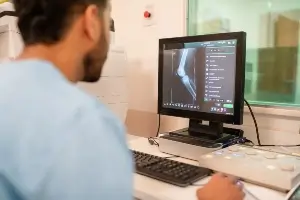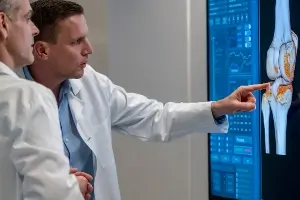Maximizing Your Knee Injury Settlement: A Minneapolis Car Crash Victim’s Guide
 After suffering a knee injury in a Minneapolis car crash, the path to fair compensation is often complex and challenging. Insurance companies work hard to undervalue car crash injury claims, including cases involving knee injuries. Their focus is on protecting their bottom line, not considering the serious impact a knee injury has on your mobility, ability to work, and overall quality of life.
After suffering a knee injury in a Minneapolis car crash, the path to fair compensation is often complex and challenging. Insurance companies work hard to undervalue car crash injury claims, including cases involving knee injuries. Their focus is on protecting their bottom line, not considering the serious impact a knee injury has on your mobility, ability to work, and overall quality of life.
At TSR Injury Law, our experienced car crash lawyers in Minneapolis are prepared to help you maximize your knee injury claim. We have helped countless victims secure millions in settlements for injuries caused by negligence.
This legal guide provides critical information about how knee injury claims are viewed by insurance companies and what you need to do to maximize the full value of your claim. The good news is that you do not need to face a knee injury crash claim on your own. We are prepared to guide you throughout the legal process, making sure your rights and best interests are always the focus.
Call (612) TSR-TIME for a FREE case review today.
How Do Insurance Companies Assess the Value of Knee Injury Claims in Minneapolis?
Insurance companies consider multiple factors when determining the value of a lawsuit for a knee injury. However, without an attorney to advocate for you, insurance companies will likely undervalue the full impact these injuries have on the victims’ lives.
Do you have knee pain after a car crash? If you sustained a severe knee injury because of another driver’s negligence, these are some of the key factors insurance adjusters consider when assessing the value of your claim:
- The type and severity of your knee injury (ligament tears, meniscus damage, fractures)
- Whether surgery was required or is anticipated in the future
- The length and intensity of your rehabilitation process
- Documented physical limitations and how they affect your daily activities
- Your age and pre-crash activity level
- Your occupation and how the knee injury affects your ability to work
At TSR Injury Law, we understand that the cookie-cutter formulas insurance companies use typically fail to capture the full value of your knee injury. Our attorneys consider and document all aspects of your damages to ensure insurers recognize the true value of your claim.
What Documentation Will Strengthen My Knee Injury Settlement?
Strong documentation serves as the foundation for maximizing your knee injury settlement. Insurance companies require concrete evidence to justify higher compensation amounts.
The most powerful documentation includes:
- Complete Medical Records: Ensure your records detail the diagnosis, treatment plan, and prognosis for your knee injury. Medical imaging (X-rays, MRIs, CT scans) provides objective evidence of the damage.
- Documented Proof of Consistent Treatment: Records showing you followed your physician’s medical advice and attended all appointments, including physical therapy. These records demonstrate you took reasonable steps to recover.
- Expert Medical Opinions: Written statements from orthopedic and other specialists about future limitations, additional surgeries, or potential complications strengthen your claim significantly.
- Evidence of Impact to Employment: Documentation from your employer regarding missed work, reduced hours, or accommodations needed due to your knee injury quantifies your economic losses.
- Personal Injury Journal: Maintaining a record of how your knee injury affects your life creates compelling evidence of non-economic damages like pain and suffering.
- Before and After Evidence: Photos, videos, or testimonials demonstrating your active lifestyle before the crash compared to your limitations afterward illustrate the real-world impact of your injury.
These documents create a comprehensive picture of your losses, making it much more difficult for insurance companies to justify low settlement offers.
Should I Reject the First Settlement Offer for My Knee Injury?
You should almost always reject the first settlement offer for a knee injury claim. Insurance companies strategically make initial offers before you have completed treatment and before you understand the full extent of your damages. These initial offers are typically far lower than the full value of your claim. This is particularly true with knee injuries, which often develop secondary complications, like post-traumatic arthritis, and back injuries months or years after the crash.
Reject the first offer if the following applies to your situation:
- You are still undergoing medical treatment or rehabilitation
- You have not fully recovered from your injuries
- The offer does not account for any future medical needs you may have
- You have not returned to work or don’t know if you can resume your previous position
- The offer was made immediately after opening your claim, indicating it’s a “quick settlement” tactic
- The amount barely covers your current medical bills, let alone other damages
One of the best steps you can take to ensure you recover the full and fair compensation you need and deserve is to call our highly qualified legal team at TSR Injury Law. We can evaluate any settlement offer to determine if it fairly compensates you for both current and future damages related to your knee injury.
How Are Future Medical Costs Calculated in Knee Injury Claims?
Knee injuries frequently require ongoing or future medical care. These additional costs must be factored into your settlement; you do not want to end up paying for them out of your own pocket later on. Insurance companies often omit or minimize these costs in their initial offers.
Here are some common examples of the future medical costs often needed for knee injuries:
- Additional Surgeries: Many knee injuries require multiple surgical interventions, especially if the initial repair does not fully restore function.
- Joint Replacement: Post-traumatic arthritis from car crash injuries often leads to knee replacement surgery years after the initial trauma.
- Ongoing Physical Therapy: Extended rehabilitation may be necessary to maintain function and manage pain.
- Pain Management: Chronic knee pain often requires ongoing treatment, including medication, injections, or specialized procedures.
- Assistive Devices: Braces, canes, or other mobility aids may be needed temporarily or permanently.
- Home Modifications: Serious knee injuries might necessitate changes to your living environment to accommodate mobility limitations.
Accurately calculating these costs requires expert medical opinions and economic analysis. Our attorneys work with medical and economic experts to project the lifetime cost of your knee injury treatment, ensuring your settlement accounts for all future needs.
What Impact Does Minnesota’s Comparative Fault Law Have on My Settlement?
Minnesota follows a “modified comparative fault” system with a 51 percent bar rule. This means you can recover damages as long as you are not more than 50 percent responsible for the crash. However, your percentage of fault will be deducted from any awarded compensation.
For example, if you are deemed 20 percent at fault for the crash that injured you, any settlement you receive would be reduced by 20 percent. So, if your total damages are valued at $100,000, you will receive $80,000.
Insurance companies often try to shift blame to injured victims to reduce settlements. They may claim:
- You were driving too fast for conditions
- You failed to take evasive action
- You were not wearing a seat belt (though this cannot be used to reduce compensation in Minnesota)
- Your knee was already damaged before the crash
Our attorneys at TSR Injury Law aggressively counter these tactics with evidence that establishes the other driver’s liability and minimizes any comparative fault unfairly assigned to you.
How Long Do I Have to File a Knee Injury Claim in Minneapolis?
In Minnesota, you generally have six years from the date of the crash to file a personal injury lawsuit for your knee injury. However, waiting too long can seriously damage your claim’s value.
When you delay bringing your knee injury claim, you risk the following:
- Crucial evidence may disappear, get lost or be destroyed
- Witnesses may forget key details that could support your claim
- Creating documentation gaps due to delaying medical treatment for your knee injury
- Giving insurance companies reasons to question the severity of your injuries
- Missed filing deadlines for certain types of claims
It is worth mentioning that some situations may have shorter deadlines.
To protect your rights to maximum compensation, we recommend contacting our trusted law as soon as possible after your knee injury.
What Role Do Expert Witnesses Play in Maximizing Knee Injury Settlements?
Expert witnesses provide specialized knowledge that can help to substantiate the value of your claim and counter insurance company tactics.
For knee injury cases, several types of experts are particularly valuable:
- Orthopedic Surgeons: These specialists can testify about the nature and extent of your knee injury, necessary treatments, and long-term prognosis.
- Rehabilitation Specialists: Physical therapists and rehabilitation doctors explain the recovery process and any permanent limitations you face.
- Life Care Planners: These experts calculate the lifetime cost of medical care, assistive devices, and accommodations needed for your knee injury.
- Economic Experts: Economists quantify your lost earnings, reduced earning capacity, and the present value of future financial losses.
- Accident Reconstructionists: These specialists can establish how the crash occurred and generate evidence of the forces that caused your knee injury.
At TSR Injury Law, we have relationships with highly qualified experts across these fields who can strengthen your knee injury claim and help maximize your settlement.
How Can Lost Earning Capacity Increase My Knee Injury Compensation?
Lost earning capacity refers to your reduced ability to earn income in the future due to your knee injury. This often represents one of the largest components of serious knee injury settlements.
Knee injuries frequently impact earning capacity through:
- Physical Limitations: Inability to stand for long periods, climb, kneel, or lift can eliminate many occupations from consideration.
- Reduced Work Hours: Pain, fatigue, and medical appointments may prevent full-time work.
- Career Path Disruption: You may be unable to continue in your chosen profession or advance as expected.
- Early Retirement: Severe knee injuries might force you to leave the workforce years before planned.
- Retraining Costs: The need to learn new skills for less physically demanding work can add significant expenses.
Our attorneys work with vocational experts and economists to calculate the lifetime financial impact of these limitations. For younger victims especially, lost earning capacity can significantly increase the value of a claim.
What Are the Most Valuable Non-Economic Damages in Knee Injury Cases?
Non-economic damages are intangible losses that are harder to quantify because there is no specific dollar amount attached. For knee injuries, these damages often exceed the value of medical expenses and lost wages.
The most significant non-economic damages in knee injury cases include:
- Pain and Suffering: Physical pain from the injury, surgeries, and rehabilitation, including chronic pain that persists long-term.
- Loss of Enjoyment: Inability to participate in hobbies, sports, family activities, and other pleasurable aspects of life due to knee limitations.
- Emotional Distress: Anxiety, depression, and frustration related to physical limitations and chronic pain.
- Loss of Independence: Reliance on others for basic activities like driving, shopping, or household chores.
- Physical Disfigurement: Scarring from surgeries or changes in gait that affect appearance and self-image.
Insurance companies typically resist paying fair value for these damages. At TSR Injury Law, we know how to document and present non-economic damages persuasively to maximize your total compensation.
How Do Previous Knee Problems Affect My Car Crash Settlement?
Pre-existing knee conditions do not prevent you from receiving compensation, but they can complicate your claim. In Minnesota, the “eggshell plaintiff” rule holds that defendants must take victims as they find them. This means they are responsible for all harm resulting from their negligent actions, even if you were more vulnerable due to a pre-existing condition.
If you had previous knee issues, insurance companies will likely try to argue:
- Your current symptoms existed before the crash
- The crash merely “aggravated” a pre-existing condition temporarily
- Your damages should be significantly reduced because of your prior knee problems
To counter these arguments, our attorneys:
- Obtain pre-crash medical records to establish your baseline condition
- Work with medical experts to clearly differentiate new injuries from pre-existing ones
- Document how the crash worsened or accelerated your knee problems
- Demonstrate the specific damages attributable to the crash-related aggravation
With proper documentation and expert testimony, previous knee problems can sometimes increase your settlement by showing you were more severely affected by the crash than someone with healthy knees would have been.
What Settlement Tactics Do Insurance Companies Use Against Knee Injury Victims?
Insurance companies use several tactics to try to minimize knee injury settlements. Some key tactics they may try include:
- Disputing Medical Necessity: Insurers often claim certain treatments, particularly surgeries, were not medically necessary for your knee injury.
- Putting You Under Surveillance: For knee injury claims, insurance companies may conduct surveillance to catch you performing activities inconsistent with the limitations you claim.
- Social Media Monitoring: Adjusters search your online profiles for photos or posts that might contradict your injury claims.
- Delayed Processing: Stretching out your claim in hopes you may give up and accept a lower amount out of financial necessity.
- Quick Settlement Offers: Pressuring you to accept an offer before you understand the full extent of your injuries.
TSR Injury Law is extremely familiar with the tactics insurance companies use, and we also know how to implement strategies to protect your interests and maximize your settlement.
When Is It Better to Go to Court for a Knee Injury Case?
Many crash victims are concerned they may have to go to court to recover the compensation they need. However, most knee injury claims settle without a trial or the need to go to court.
Going to court may become necessary under the following circumstances:
- The insurance company denies liability despite clear evidence
- Settlement offers are significantly below your claim’s value after repeated negotiation attempts
- Disputes about the cause or severity of your knee injury persist
- The insurer acts in bad faith during the settlement process
- Your damages exceed the at-fault driver’s policy limits, requiring claims against multiple insurance companies
- Complex legal issues exist, such as product liability for vehicle defects that contributed to your knee injury
Filing a lawsuit does not mean your case will necessarily go to trial. Often, the litigation process motivates insurance companies to make reasonable settlement offers. We prepare every injury case as if it will go to trial. This approach strengthens our negotiating position and ensures we are ready if court becomes necessary.
Contact TSR Injury Law for Your FREE Case Evaluation
If you suffered a knee injury in a Minneapolis car crash, you do not have to navigate the complex legal process alone. Insurance companies have teams of adjusters and lawyers working to minimize your compensation.
At TSR Injury Law, our proven track record of securing favorable settlements for our clients comes from having decades of experience and our extensive knowledge of both the medical and legal aspects of these cases.
Worried about cost? We work on a contingency fee basis, which means you pay us nothing unless we win compensation for you.
Call for your free case review today: (612) TSR-TIME


 Motor vehicle crashes often cause serious knee injuries that require immediate medical care. Sometimes victims may put off seeking treatment because of the inconvenience or concerns about the costs. However, that is a bad idea, because delayed medical treatment can have significant consequences, including putting your health and legal rights at risk.
Motor vehicle crashes often cause serious knee injuries that require immediate medical care. Sometimes victims may put off seeking treatment because of the inconvenience or concerns about the costs. However, that is a bad idea, because delayed medical treatment can have significant consequences, including putting your health and legal rights at risk. The knee is one of the most complex and vulnerable joints in the human body, making it far more susceptible to acute injuries during motor vehicle crashes. Victims with knee injuries often need extensive medical treatment and rehabilitation.
The knee is one of the most complex and vulnerable joints in the human body, making it far more susceptible to acute injuries during motor vehicle crashes. Victims with knee injuries often need extensive medical treatment and rehabilitation.